
FEATURE: An Evening with Joss Whedon
It’s hard not to feel for Joss Whedon. Dedicating all that time, love and energy into television productions that end up rode to ruin (Dollhouse), killed off long before their time (Firefly), or simply asked to ‘move on’ (Buffy the Vampire Slayer, Angel) must make life pretty hard. Then again, when your legions of fans think you’re the closest thing to divinity, it can’t all be bad.
Walking onto stage at the recent Melbourne Writer’s Festival to a rock-star reception, Whedon acts like a man who’s learnt to cope with a career defined by both adoration and rejection. As the crowd settles, conversation turns immediately to the question of his holiness. So, how does Joss feel about being God?
Well, when I made the mountains I thought, ‘they’re good’…but I don’t believe in me…which is actually awkward.
Whedon’s trademark humour, a beguiling blend of tongue-in-cheek egotism and self-deprecation (a characteristic of his writing) is one of his more endearing qualities. While he’s best known for his TV work, initially Whedon had little interest in following the ‘family business’ into writing for the small screen. “Television”, he confesses “was a bad thing for dumb people”. At least that’s what he believed until he realised you could get paid for it.
Nowadays, Joss has an altogether different view of TV, describing it as ‘the great love of his life’. For Whedon, the collaborative aspects of television production (working with writers, developing characters, the close relationships with actors) are ‘a gift’ that is unique to the medium: “The thing that TV has, nothing else has”.
As he reflects on these good times, it’s almost possible to forget about his well-publicised run-ins with television executives (whom he describes as “evil, obtuse, difficult and Satanic”) that resulted in rewrites, re-shoots, and inevitably cancellations. Of all the shows put to the studio sword, Joss describes the demise of Firefly as “the most upsetting”. But in spite of all the heartache, Whedon still has his sense of humour:
Television broke up with me. It said we can still be friends. But it wanted to see other people.
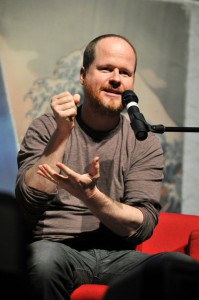 Gradually, conversation shifts to the dominant themes in his work, such as the representation of mental illness (of which he admits to having a romanticised view) and the role of the corporation. On the subject of the latter, Whedon, who describes himself as a “1970s Upper West Side Lefty” is particularly forthright:
Gradually, conversation shifts to the dominant themes in his work, such as the representation of mental illness (of which he admits to having a romanticised view) and the role of the corporation. On the subject of the latter, Whedon, who describes himself as a “1970s Upper West Side Lefty” is particularly forthright:
What these corporations do is marginalise the individual so that the corporations can ultimately dictate how the individual lives and keep people poor and keep people dependent and keep people consuming and they do this so they can keep their margin profit where they want it, not where it needs to be in order for them to survive, but wherever the fuck they want it. I very strongly believe that certainly in America the culture of the giant company is here and it is destroying the fabric of our society.
For the time being at least, the writer/director has swapped his ties to television for the world of cinema, and is currently working on an adaptation of Marvel’s The Avengers. No stranger to the world of comics, Whedon recalls his frustration at the lack of decent filmic adaptations, until he saw Sam Raimi’s Spider-Man (2002) and realised that good comic book movies were possible. In the years since, Hollywood’s ongoing fascination with comics and graphic novels has, according to Whedon, produced mixed results.
There have been a couple that hit…but most of them haven’t and I also feel that we went from the really terrible Hollywood executive’s idea of what a comic book movie should be to a very short moment when we sort of started getting it right and then went directly to the postmodern, directly to Watchmen, Kick-Ass, Dark Knight where we’re taking the comic book for granted and now we want to see what’s behind it and I’m like ‘oh whoa wait a minute’, first I want to see an awesome movie about superheroes that are awesome, that I really care about the whole time and I haven’t seen enough of those. I don’t want to deconstruct it yet, first I want to construct it.
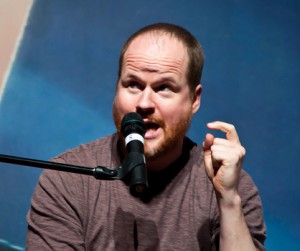 So will Whedon’s creative reign on The Avengers lead him once again into conflict with studio executives? At this stage the director remains upbeat that his association will be mutually agreeable.
So will Whedon’s creative reign on The Avengers lead him once again into conflict with studio executives? At this stage the director remains upbeat that his association will be mutually agreeable.
Marvel know exactly what they want to do but they don’t mind a filmmaker making his film in the service of what it is they want to do. They don’t try and press me into something that isn’t me, which is really gratifying.
Hopefully, Whedon’s optimism will prove well-founded. Although, with The Avengers not set for release until 2012 there’s still a long wait ahead to see if he’ll be able to satisfy both the bean-counters and his broad base of fans. And if the film is a success, does that mean Joss won’t be returning to the world of television?
It’s something I adore, and it may be my favourite kind of storytelling, but I’m not going to do it for a while. Ultimately, I’m perfectly happy as long as I’m telling some kind of story. I’ll never turn my back on it. I just have to find a venue where they’ll let me make it the way that I make it, which is a little antithetical to TV.
If that happens then I’m sure we can all agree it will have been worth the wait.
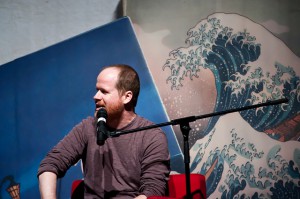
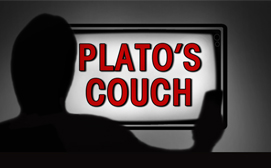

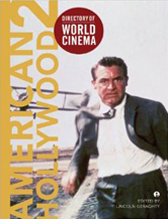
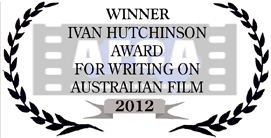
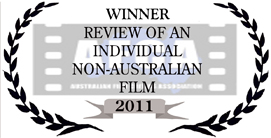
“but i dont believe in me… which is actually awkward” – gold!
And the comic timing was perfect!
hey good job man.
On hearing confirmation of the much speculated Warner Brother reboot of the original BTVS movie (sans him) creator of Buffy the Vampire Slayer Joss Whedon must be ruefully reflecting today that the problem with vampire franchises is… they just won’t die off! LOL!